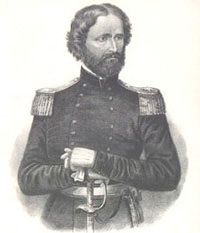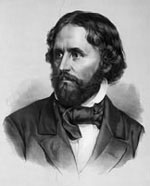General John C. Fremont
A Southerner, John Fremont was born in Savannah, Georgia on January 21, 1813. Educated at Charleston College, he taught mathematics before joining the Army Topographical Engineers Corps in 1838, where he spent the first seven years of his military ca reer surveying and mapping the area between the upper Mississippi and Missouri rivers, the Des Moines River, and most of the Oregon Trail. reer surveying and mapping the area between the upper Mississippi and Missouri rivers, the Des Moines River, and most of the Oregon Trail.
In 1843, Fremont made his third expedition, in which he explored the Great Basin and the Pacific Coast.
He was in the area of the Pacific Coast when the Mexican War broke out. Fremont was given the rank of Major in the U.S. Army. He helped annex California to the Union, and was appointed Governor of the new state.
In 1847, however, he clashed with General Kearney and was arrested for mutiny and insurbordination, and subsequently court-martialed. President Polk intervened, securing his release.
In the winter of 1848 and 1849, Fremont led an expedition to locate passes for a proposed railway line from the upper Rio Grande to California. Gold was discovered on his estate, and he became a multi-millionaire.
In 1850, he was elected Senator for California. A fervent opponent of slavery, he was a founding member of the Republican Party, and was chosen as its first presidential candidate, running against the Democratic candidate, James Buchanan. It was a close election, but Buchanan won.
When Lincoln was elected President in 1860, Fremont expected a Cabinet position. Lincoln was reluctant to do this, but instead proposed that he be appointed minister to France. William Seward, Secretary of State, objected on the grounds that, as a Southerner, Fremont could not be trusted.
In Europe at the outbreak of the Civil War, Fremont took it upon himself to purchase a cache of arms in England for the North, and returned to America. He was one of four Major Generals appointed by Lincoln, put in command of of the newly created Western Department, based in St. Louis.
He was criticized for spending more time fortifying the city and developing flashy guard units than equipping the troops in the field. His forces sustained heavy losses, including the defeat at Wilsonís Creek on August 10, 1861.
On August 30, 1861, perhaps trying to gain a political advantage where he had lost the military one, Fremont took it upon himself to declare that all slaves owned by Confederates in Missouri were free, fearing that this action would force slave owners in adjoining states to join Confederate forces. Lincoln asked that Fremont rescind his order, and Fremont refused.
Lincoln relieved Fremont of his command in 1861, replacing him with General Henry Halleck.
Fremont was a popular figure among radical Republicans and many in the press, who lobbied in his defense. In March of 1862, Lincoln agreed to appoint him as the commander of the newly established Mountain Department.
However, Fremont was severaly criticized for failing to deal with Thomas Stonewall Jackson during the Shenandoah Valley campaign. In June, Fremontís troops were placed under the control of General John Pope. Fremont refused to serve under Pope, and spent the rest of the war in New York.
In May, 1860, a group of radical Republ icans selected Fremont as their candidate for President. Afraid of division within the Republican Party, Lincoln began negotiations to get him to change his mind. In the end, Fremontís price was the removal of his old political enemy, Montgomery Blair, from the Cabinet. Lincoln agreed, and Blair was replaced with William Dennison. icans selected Fremont as their candidate for President. Afraid of division within the Republican Party, Lincoln began negotiations to get him to change his mind. In the end, Fremontís price was the removal of his old political enemy, Montgomery Blair, from the Cabinet. Lincoln agreed, and Blair was replaced with William Dennison.
After the war, Fremont invested heavily railroad financing, losing most of his fortune. He returned to politics, becoming Governor of the Arizona Territory from 1873 to 1883.
He died on July 13, 1890.
|

